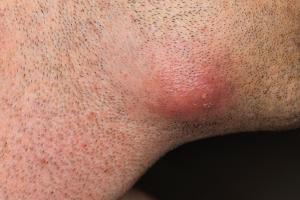Abscess
An abscess is a painful collection of pus, usually caused by a bacterial infection. Abscesses can develop anywhere in the body. See your GP if you think you may have one. They usually won’t get better without treatment.
Symptoms of an abscess
The symptoms of an abscess depend on where it develops in your body.
Skin abscesses
Signs of a skin abscess can include:
- a smooth swelling under your skin that can feel hard or firm
- pain and tenderness in the affected area
- warmth and redness in the affected area
- a visible build-up of white or yellow pus under the skin in the affected area
- a high temperature (fever)
- chills

A boil is a common example of a skin abscess.
Internal abscesses
Abscesses that develop inside an organ or in the spaces between organs can be more difficult to identify than skin abscesses.
The symptoms can be vague. There may be no obvious external signs of a problem.
The symptoms of an internal abscess can also vary. This depends on exactly where in the body the abscess develops.
For example, a liver abscess may cause jaundice, while an abscess in or near the lungs may cause a cough or shortness of breath.
General symptoms of an internal abscess can include:
- discomfort in the area of the abscess
- fever
- increased sweating
- feeling sick
- vomiting
- chills
- pain or swelling in your tummy (abdomen)
- loss of appetite and weight loss
- extreme tiredness (fatigue)
- diarrhoea or constipation
When to see your GP
See your GP if you think you may have an abscess.
They can examine a skin abscess or refer you to hospital for investigations if they suspect that you may have an internal abscess.
There are several tests available to help diagnose an abscess. They will depend on where it's located on, or in, your body.
Causes of abscesses
Most abscesses are caused by a bacterial infection.
When bacteria enter your body, your immune system sends infection-fighting white blood cells to the affected area.
As the white blood cells attack the bacteria, some nearby tissue dies. This creates a hole which then fills with pus to form an abscess.
Treating an abscess
A small skin abscess may drain naturally, or simply shrink, dry up and disappear without any treatment.
Larger abscesses may need to be treated with antibiotics to clear the infection. The pus may need to be drained.
This will usually be done either by inserting a needle through your skin or by making a small incision in the skin over the abscess.
Preventing a skin abscess
Most skin abscesses are caused by bacteria getting into a minor wound, the root of a hair or a blocked oil or sweat gland.
Ensuring that your skin is clean, healthy and largely free of bacteria can help reduce the risk of skin abscesses developing.
You can reduce the risk of bacteria spreading by:
- washing your hands regularly
- encouraging people in your family to wash their hands regularly
- using separate towels and not sharing baths
- waiting until your skin abscess is fully treated and healed before using any communal equipment, such as gym equipment, saunas or swimming pools
Don't squeeze the pus out of the abscess yourself. This is because this can easily spread the bacteria to other areas of your skin.
If you use tissues to wipe any pus away from your abscess, dispose of them straight away to avoid germs spreading. Wash your hands after you've disposed of the tissues.
Take care when shaving your face, legs, underarm areas or bikini area to avoid nicking your skin. Clean any wounds immediately.
Don't share razors or toothbrushes.
It may also help to reduce your risk of skin abscesses by:
- maintaining a healthy, balanced diet
- losing weight if you're overweight or obese
- stopping smoking
It's difficult to prevent internal abscesses, as they're often complications of other conditions.
Other types of abscess
There are many other types of abscess including:
- an anorectal abscess – a build-up of pus in the rectum and anus
- a Bartholin's abscess – a build-up of pus inside one of the Bartholin's glands, which are found on each side of the opening of the vagina
- a brain abscess – a rare but potentially life-threatening build-up of pus inside the skull
- a dental abscess – a build-up of pus under a tooth or in the supporting gum and bone
- a quinsy (peritonsillar abscess) – a build-up of pus between one of your tonsils and the wall of your throat
- a pilonidal abscess – a build-up of pus in the skin of the cleft of the buttocks (where the buttocks separate)
- a spinal cord abscess – a build-up of pus around the spinal cord
More useful links
The information on this page has been adapted from original content from the NHS website.
For further information see terms and conditions.